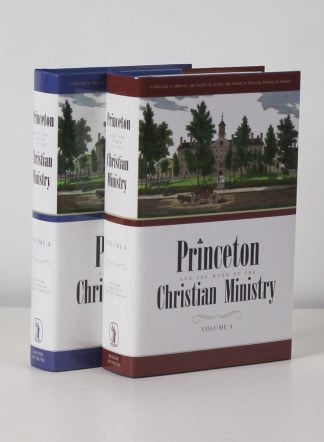‘Princeton and the Work of the Christian Ministry’ – A Review by Greg Goswell
These two volumes1 contain a splendid collection of 70 addresses, essays, and articles by faculty and friends of Old Princeton, the theological seminary before its reorganisation in 1929. They show that it was more than a bastion of orthodoxy; it was the cradle for evangelism, mission, and pastoral work. As James Garretson remarks, ‘The Princetonians’ high view of Scripture was accompanied by an equally high view of the calling and Responsibilities associated with the ministerial office.’ The seminary was founded as ‘a nursery of vital piety,’ and its founders and teachers saw both godliness and scholarship as essential to a faithful and effective ministry.
The ‘plan’ or constitution of the seminary (1811) makes explicit the conviction ‘that religion without learning, or learning without religion, in the ministers of the Gospel must ultimately be injurious to the church.’ Founding professor, Samuel Miller, in a sermon on 2 Timothy 2:2 insists that ‘the first requisite to form a faithful and able minister is piety.’ At the inauguration of the other founding professor, Archibald Alexander, it was stated: ‘Whatever may be the talents of ministers, they are like, without personal piety, to be of no lasting advantage to the church.’ Alexander himself insists on the essential relation of sound doctrine, pious feelings, and moral character, and Alexander’s writings on the nature and character of religious experience are justly famous. He quotes (and translates) Witsius, who wrote: ‘The student of the Bible must be at the same time the disciple of the Spirit.’
The teachers of Old Princeton did not teach a lifeless orthodoxy. An example of their emphasis is a heartfelt address by Alexander to candidates for the ministry on the need for eminent piety. Perhaps in a review it is not inappropriate to mention Alexander’s lecture on ‘The Use and Abuse of Books’, in which he reminds bookworms that reading is not a substitute for doing our own independent thinking on a subject. There is, then, the danger of reading too much! Samuel Miller brings out the awesome responsibilities of Gospel ministry, urging students to make good use of their years of preparation, acquiring habits of study that will go with them into ministry. Lest we think for a moment that Miller sees learning as the sole key to ministry success, he also insists that Christ is the great model of Gospel ministers. These two professors refused to separate what Scripture joins, namely study and piety, hard work and constant prayer.
Ashbel Green rejects the claim that study is injurious to piety and ministry success. A. A. Hodge in his inaugural address as professor speaks for the whole Princeton tradition when he says, ‘The systematic theologian as well as the exegete is only an interpreter (of Scripture).’ Theirs was a Bible-based orthodoxy, one that preached, evangelised, and led to consecrated living for Christ. Old Princeton never succumbed to cold orthodoxy. With Hodge we should refuse to make a false divide between creed and morality, or faith and practice; rather, ‘truth is in order to holiness.’
The endpoint and highpoint of the Princeton tradition was B.B. Warfield (1851-1921), and his death marked the end of Old Princeton. Warfield wages a war against the all-too-common idea that the less theology a minister has the better. Volume Two contains his famous address, ‘The Religious Life of Theological Students’. Warfield insists that the minister must be both learned and religious; it is not a matter of choosing one rather than the other. He puts it bluntly, ‘There is certainly something wrong with the religious life of a theological student who does not study!’
J. Gresham Machen also wrote of the essential relation between knowledge and piety, or, otherwise expressed, between culture and Christianity. He said, ‘The church is perishing today through lack of thinking, not through an excess of it.’
The twin volumes of over 1300 pages show the balanced approach of the teachers of pre-1929 Princeton, and a thoughtful and prayerful reading of these volumes will also help us to regain and maintain our spiritual balance.
Notes

Princeton and the Work of the Christian Ministry
2 Volume Set: A Collection of Addresses and Articles by Faculty and Friends of Princeton Theological Seminary
price $53.10Description
These two volumes1 contain a splendid collection of 70 addresses, essays, and articles by faculty and friends of Old Princeton, the theological seminary before its reorganisation in 1929. They show that it was more than a bastion of orthodoxy; it was the cradle for evangelism, mission, and pastoral work. As James Garretson remarks, ‘The Princetonians’ […]
Taken with permission from New Life, Australia’s Christian Newspaper, October 1, 2014 edition.
Latest Articles
Finished!: A Message for Easter March 28, 2024
Think about someone being selected and sent to do an especially difficult job. Some major crisis has arisen, or some massive problem needs to be tackled, and it requires the knowledge, the experience, the skill-set, the leadership that they so remarkably possess. It was like that with Jesus. Entrusted to him by God the Father […]
Every Christian a Publisher! February 27, 2024
The following article appeared in Issue 291 of the Banner Magazine, dated December 1987. ‘The Lord gave the word; great was the company of those that published it’ (Psalm 68.11) THE NEED FOR TRUTH I would like to speak to you today about the importance of the use of literature in the church, for evangelism, […]
